Monday, December 31, 2007
THE NEXT BIG THING: FROM CSR TO SD?
I was particularly struck by this piece on the ‘Next Big Thing’ in today’s Financial Times:
Goodbye to corporate social responsibility?
Never mind rising sea levels: the waves of cynicism washing over corporate executives as they push their CSR agendas promise to become life-threatening in 2008. In the inevitable life cycle of management fads CSR is now heading for the exit. Customers are generally unconvinced by the hype. And “social responsibility” was always too flimsy a concept to gain serious traction with business leaders.
That gives us a clue as to the identity of the next Big Thing in management: sustainability. Unlike CSR, this concept has some meat and commercial potential to it. Innovations that make money while helping to reduce carbon emissions are actually worth pursuing. So here’s one further prediction for next year: the urgent rebranding to be carried out by all those CSR consultancies, which will be replacing the old acronym with the more contemporary “sustainability” label.
Stefan Stern.
For more: http://www.ft.com/cms/s/0/eb14b4b2-b6fe-11dc-aa38-0000779fd2ac.html?nclick_check=1
Tuesday, December 25, 2007
POISONED
Thundering rain in the night, continuing as I woke to Christmas 2007. We had decided not to travel, but instead to catch our breath before 2008. Gaia is heading off to Cornwall to make a film, Hania to Transylvania, so we’re on our own – though we had a rare dinner party on the 22nd with the likes of Adam Ford (who was vicar at St Paul’s Girls’ School when G and H were there) and his partner Ros, Ritu Khanna from SustainAbility, Raj Thamotheram of AXA and David Grayson, now of Cranfield University. Joyous evening, then went out to a nearby drinks party on 23rd with Penny Egan (who I first knew when she ran the RSA) and her family.
Otherwise we have been reading and watching films. One of the books I’m reading at the moment is Michael Chabon’s extraordinary The Yiddish Policemen’s Union. Had read The Amazing Adventures of Cavalier & Clay when Tom Delfgaauw gave it to me some years ago, but even so have been surprised to be ensnared – though it took me 196 pages to really get into it. Truly an alternate universe.
Meanwhile one of the books Elaine gave me today was Christopher Reid’s collection of the letters of Ted Hughes. Oh dear, couldn’t help myself. Knowing he had written me into a poem that The Times ran in 1987 when he was Poet Laureate, and which subsequently appeared in his Collected Poems (http://johnelkington.com/profile-ted-hughes.htm), I confess that I took a look around to see if I appeared in any of his letters. And yes I do, in a letter to Michael Hamburger dated 12 September 1987 (pages 538-539). Fills in more of the background to his sending Margaret Thatcher a copy of The Poisoned Womb. Weird: it’s a bit like finding your likeness in an underground cave painting from a bygone era. Not sure the typo “Poisonned” was his or his editors at Faber & Faber, but really who cares?
Friday, December 21, 2007
LIVE MINT
My latest column on India’s LiveMint can be found at http://www.livemint.com/2007/12/19230850/How-to-avoid-a-Jurassic-Park.html
Wednesday, December 19, 2007
RXML – SON OF ROUTEMASTER

If I had to vote on London’s next Mayor in relation to just one issue, I would probably vote for anyone who swore to replace all this city’s wretched ‘bendy buses’ with the proposed successor to my favourite bus of all time, the Routemaster. Entering service in 1956, this was successively replaced by grotesque, gargantuan, totally inhuman constructions that seemed like something from War of the Worlds. Or something soldered together with someone who usually makes rough-and-ready water tanks. By contrast the Routemasters, the last of which was withdrawn in 2005, were warm, feminine and open, in that you could hop on and off with ease.
These days I regularly do battle, sometimes pretty much literally, with all sorts of buses when cycling around London, but with none more than the bendy variety that clog up our urban arteries like so much livid red cholesterol. Ken Livingstone said in 2000 that “only a ghastly, dehumanised moron would want to get rid of” the Routemaster. Hmmm. He did a U-turn four years later. Next year’s Mayoral elections will revolve around many issues, but here’s one around which Londoners could surely come together? What better symbol for the London we want? The new RMXL, which could be in service by 2010 (http://business.timesonline.co.uk/tol/business/industry_sectors/transport/article3071104.ece), would bring back that open deck and, in addition, be hydrogen-powered. My pencil’s itching.
Tuesday, December 18, 2007
WAS BALI A SUCCESS?
Was asked on short order by openDemocracy to do an appreciation of the outcomes of the climate change conference in Bali – and the result can be found at http://www.opendemocracy.net/article/climate_change/was_bali_a_success.
Wednesday, December 12, 2007
DEMOCRACY & SUSTAINABILITY
Across from Heathrow this morning to the Dana Centre (http://www.danacentre.org.uk/) at the Science Museum to meet John Lotherington of the 21st Century Trust and people from the Museum, to discuss the two-part conference we’re planning together for 18 March on the theme of ‘Democracy & Sustainability’. Seems to me that this is one of the great themes of our age, i.e. whether current forms of democracy are constitutionally unable to grapple with the sorts of fundamental challenges that issues like climate change now pose.
For me history is at best equivocal on this. During the Depression, FDR took extraordinary powers and ditto Churchill in WWII. On the other hand, there is the post-WWII Marshall Plan. Interesting to see Al Gore saying that the challenge we now face is equivalent to the Manhattan Project, the Marshall Plan and the Apollo Program, all rolled into one – and done simultaneously, at scale. And here’s a Dana Centre view, inside out. Seemed to me to sum up the need to turn our own thinking on all of this inside out.
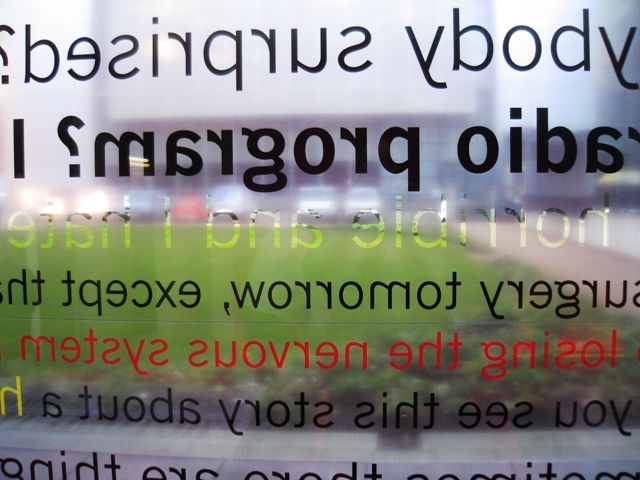
Tuesday, December 11, 2007
REINHARD MOHN FELLOWSHIP
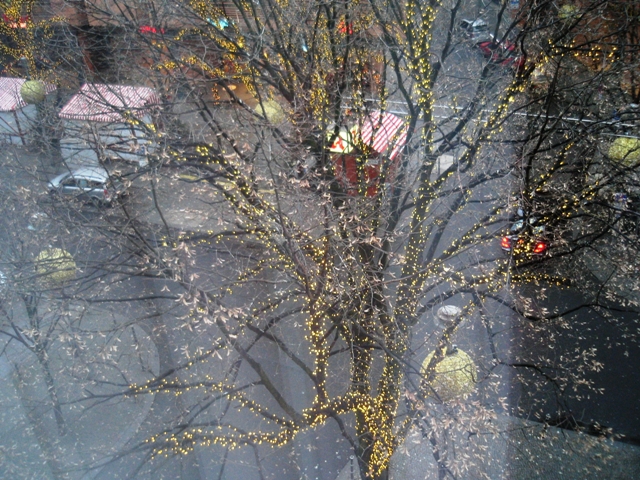
View from my bedroom window
Flew today to Berlin, with the plane landing in thick fog: only saw the runway when we were a foot or two above it. The BA pilot had said he was going to let the computers land us. In the city for an evening event hosted by Bertelsmann AG, including their CEO, honouring the Reinhard Mohn Fellowship (http://www.reinhard-mohn-fellowship.com/index.php3). The Fellowship was a gift from the Bertlesmann Executive Board to Reinhard Mohn, who rescued the company in the wake of WWII, to celebrate his eightieth birthday.
Among the speakers, Professor Dr. Dr. (sic) hc. mult. Rita Sussmuth. Charming, but I suspect that only in Germany would one come across such an impresssive honorific! I followed with a keynote – and then got a chance to meet a number of the Fellows, including Dr. Ndidi Nnoli Edozien of Nigeria’s Growing Businesses Foundation, Muhammad Azam Roomi of Pakistan’s Women’s Empowerment Group (who did a great speech) and Ellie Maxwell of Britain’s Firefly Youth Project. A joyous wake, in that the Fellowship is coming to an end. What extraordinary people.
Friday, December 07, 2007
FISH MOVING SLOW IN THE DOURO

Just back from a flying trip – with significant delays both ways – to Porto in Portugal. The conference I was speaking at was held in the giant, converted customs house alongside the River Douro, and focused on the role of small and medium-sized enterprises in Europe’s economy. A key purpose of the event was to launch the latest crop of European Enterprise Awards (http://ec.europa.eu/enterprise/entrepreneurship/smes/awards/index_en.htm).
After my session and lunch, it was pouring with rain and the Douro was cloaked in cloud, but I decided to go for a long walk, crossing Gustave Eiffel’s bridge to take a look at the cellars used to store the port wine for which the city and region is famous. Sense of time out of time, with a wonderful moment spent watching large fish moving in the green waters of the Douro.
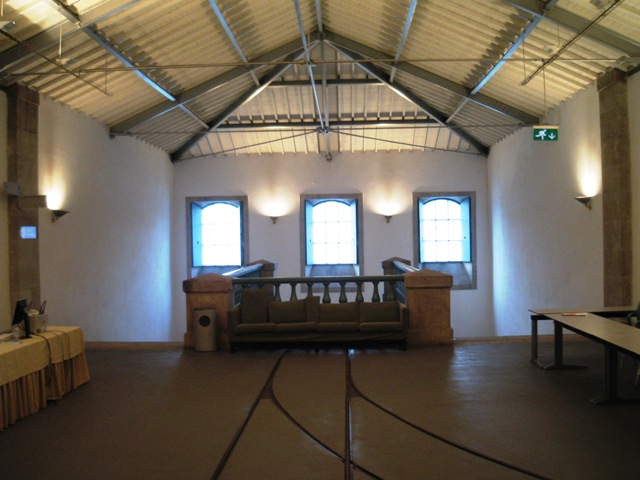
Rails from the old order disappear under sofa
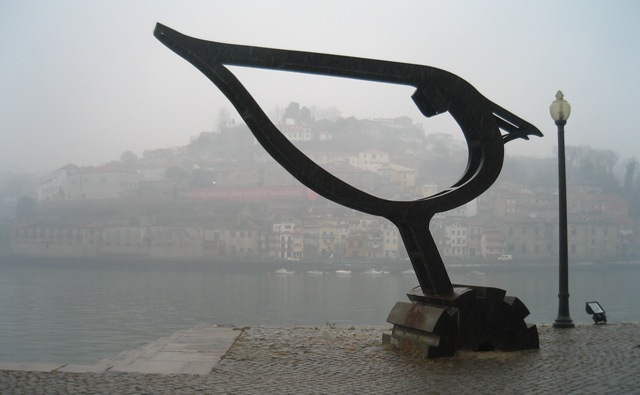
Fogscape
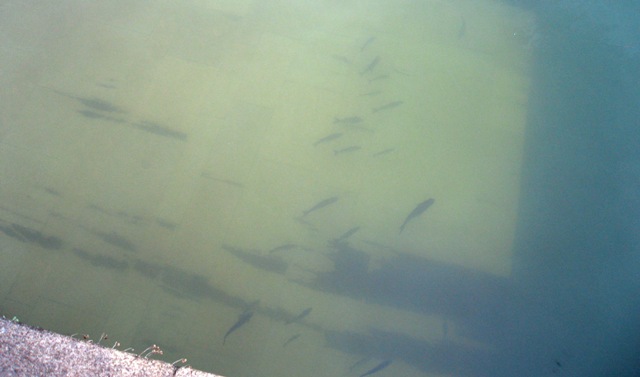
Fish
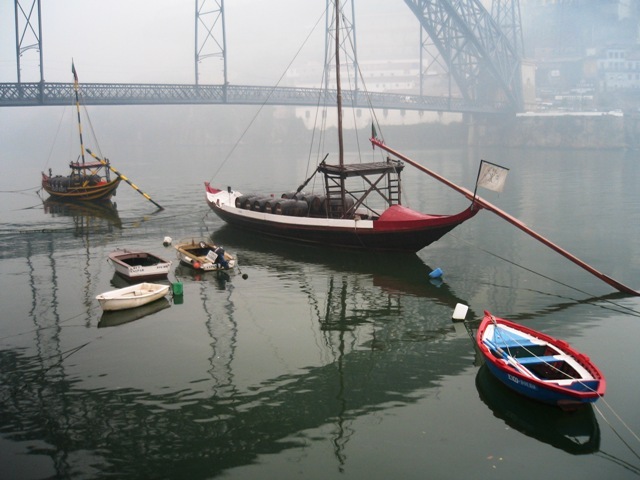
Port boats
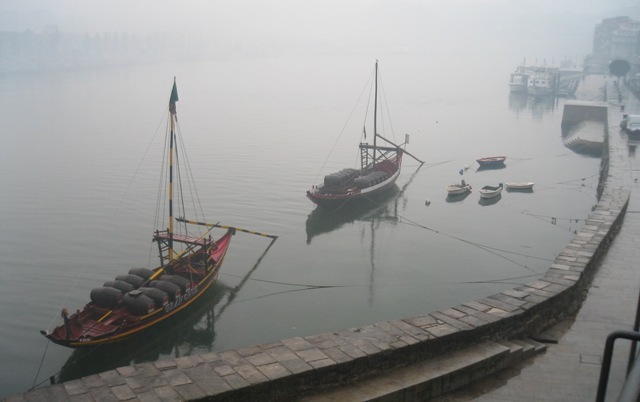
Port boats 2
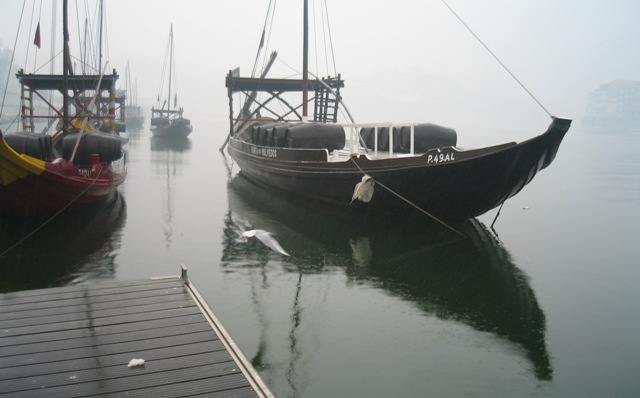
Port boats 3
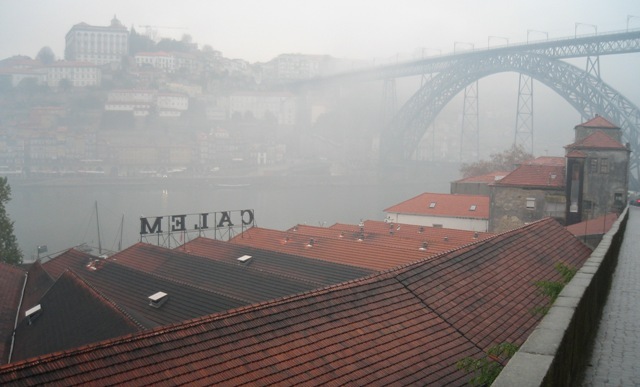
Eiffel’s bridge
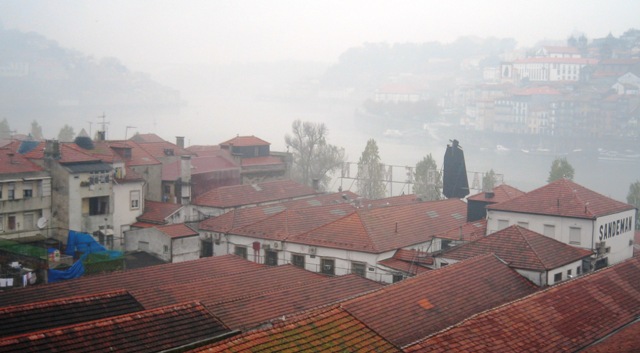
Don from behind
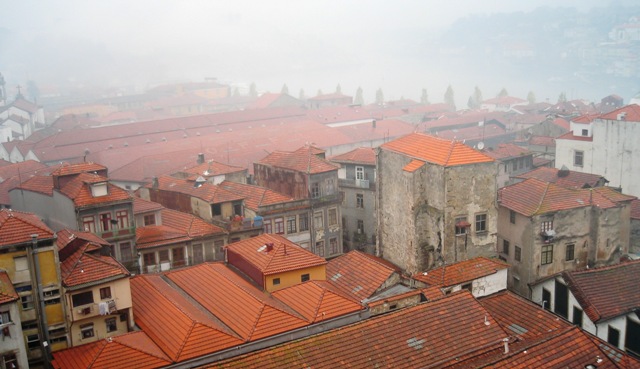
Roofscape
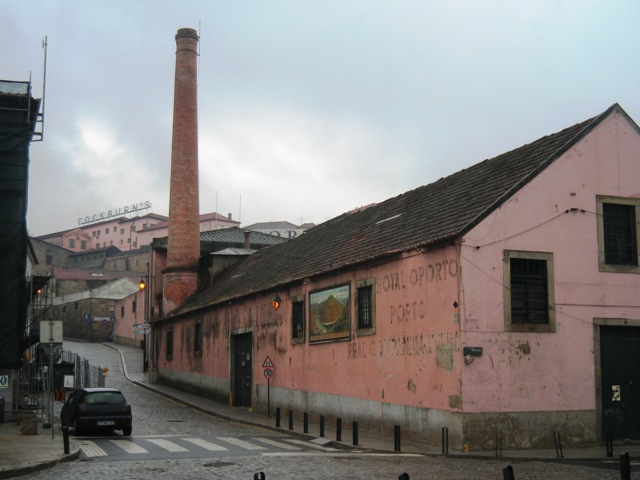
Cockburn’s
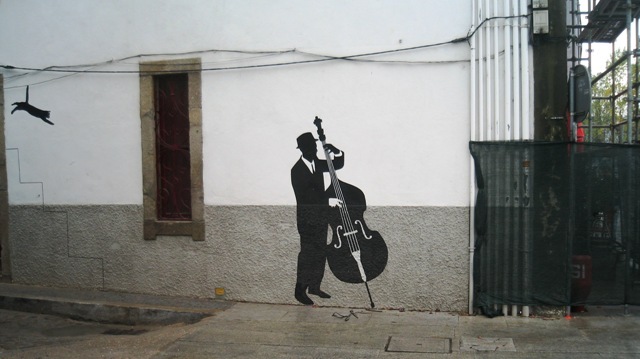
Bassist – and cat
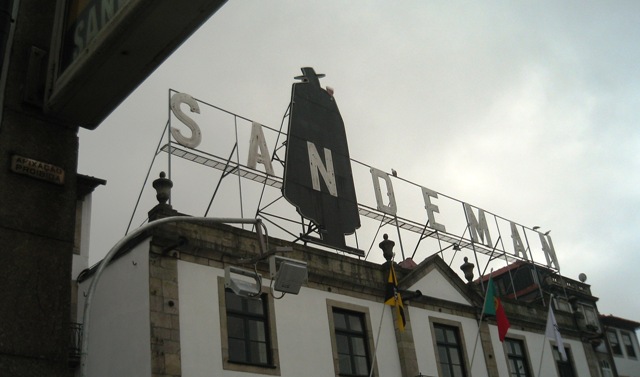
Don 2
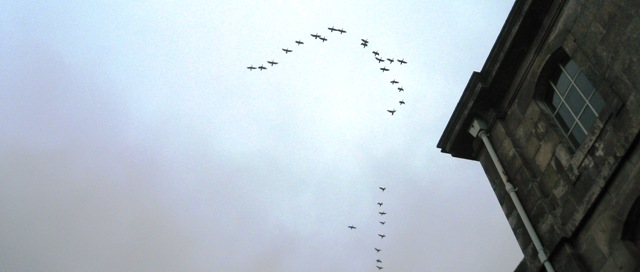
Question-mark goes over my head
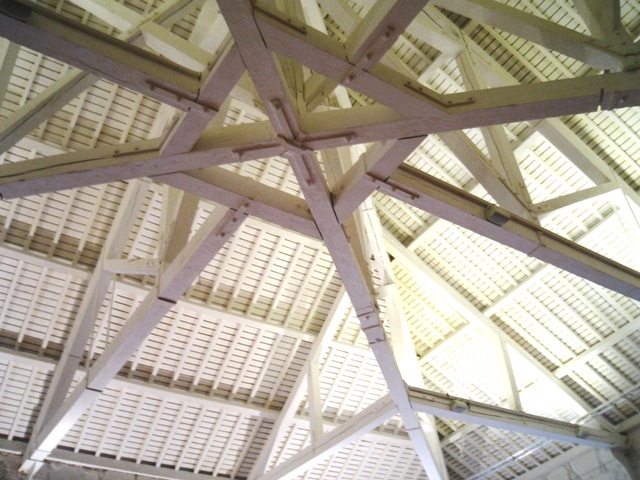
Customs House roof (detail)
Wednesday, December 05, 2007
FRONT LINE
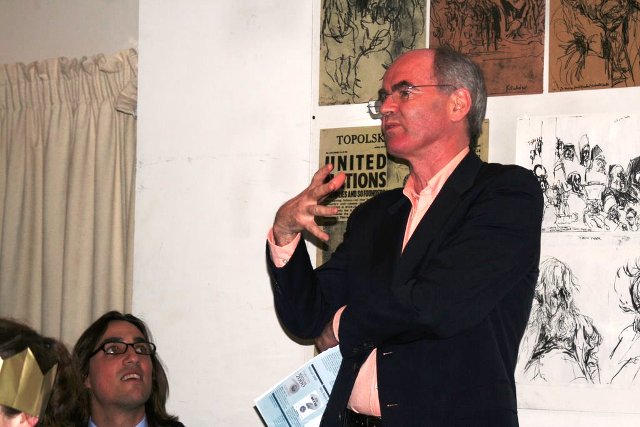
Eric Rassman, who worked on our Skoll Program, looks on, spellbound or stupefied
Truly wonderful evening with the European end of SustainAbility – plus John Schaetzl, our new non-executive director – at the Frontline Club, a charity/social enterprise that promotes independent journalism and freedom of expression worldwide (http://www.frontlineclub.com/). I did a celebration of Seb Beloe, our Vice-President of Research & Advocacy, who after around ten years with us is moving across to Henderson as their Head of SRI research.
The photographs below show him at work, rest and play – the first in our conference room, with Mark Lee, the second in a Holland Park pond, shovelling weed on a SustainAbility away day with Virginaia Terry. He and Virginia set up our first U.S. office, in New York, and in my Frontline remarks I recalled how our London team gathered around a phone and computer in our then Knightsbridge office as the U.S. team described to us what they were watching – as two jet airliners flew into the World Trade Center just across the water from them. The third, in happier times, shows Seb relaxing as Jodie (Thorpe) poles an Oxford punt on another away day, while Judy (Kuszewski) sounds of unseen shoals.
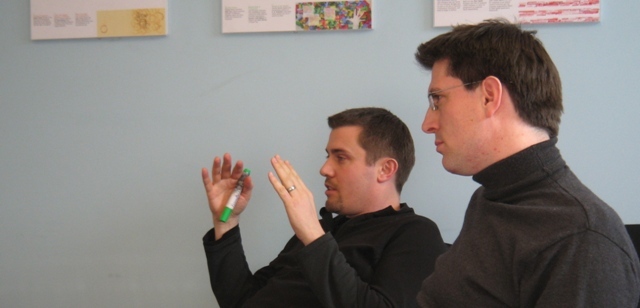
Mark and Seb
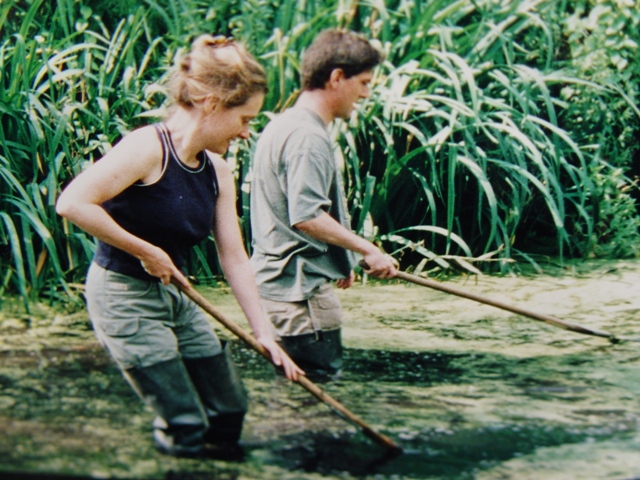
Virginia and Seb
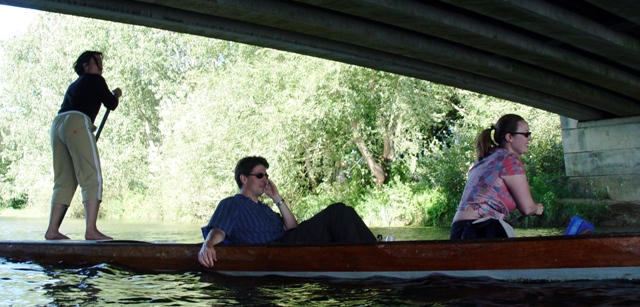
Jodie, Seb and Judy
Tuesday, December 04, 2007
SIR GEOFFREY CHANDLER SPEAKS OUT

Went to my last Trustees’ meeting at the Business & Human Rights Resource Centre this morning, handing over the role to my colleague Kavita Prakash-Mani – and magically re-emerging as Special Advisor. The Centre has evolved phenomenally since earlier days when the Trustees used to convene in SustainAbility’s offices at a weekend. Founder-Director Chris Avery is a truly remarkable social entrepreneur.
There have been few organisations I have been more excited to be part of and the decision to morph into a different role is driven simply by my sense that I should churn such appointments periodically to keep things fresh.
Then, this evening, many of us went across to SOAS for the launch of the Sir Geoffrey Chandler Speaker Series by Lord Joel Joffe, with the first speech given by Geoffrey. Wonderful event, only slightly marred by theft of my little camera, which I had stupidly left in my coat in an unguarded cloakroom when distracted by people I hadn’t seen for a while. Luckily, I have got an old variant of the same camera – given to me on a trip to Japan some years back by Canon. Video coverage of the proceedings can be found at http://www.business-humanrights.org/Documents/Chandler4Dec2007. Full text at http://www.reports-and-materials.org/Chandler-presentation-4-Dec-2007.doc.
In a key part of his speech, he called on leading NGOs to support Professor John Ruggie’s UN-backed effort to “to identify and clarify standards of corporate responsibility and accountability with regard to human rights”. He argued that:
“Such principles would indeed be norms: it was the right word – what society expects. They would not be enforceable by law, but, applicable to all companies, widely publicised, and with the authority of the UN behind them, they would be enforceable by non-legal influences – market forces, public opinion, NGO scrutiny and pressure, and indeed pressure from a company’s own staff. They would shift market influences from judging only financial results and so begin to move the first deadweight on the boulder.
“We have now spent seven years trying to develop such principles – seven years since the outset of the Norms. Professor Ruggie is in the third year of his mandate. He has engaged in a remarkably open and meticulous exercise of research and consultation to lay the basis for recommendations. But the completion of his mandate is now being delayed, if not opposed, by the human rights NGOs for reasons whose rationality is hard to discern. They apply the experience of dealing with states to companies which are susceptible to wholly different influences. They argue for more research into corporate abuse despite the fact that there is no variety of such abuse for which we do not already have enough evidence to devise preventative policies and principles. Moreover, their approach treats the corporate sector as an adversary rather than a stakeholder whose support, or at least absence of opposition, will be essential to any substantive step forwards. No such arguments were raised during the development of the Norms.
“I cannot sufficiently emphasise the community of interest between responsible governments, good companies and NGOs in seeing this exercise bear fruit. I hope that companies and governments will play a part in keeping it on track and that the NGOs will support a positive outcome. If for whatever reason that outcome is delayed, if we have no idea of how, by whom or by when the process will be continued, then it will be those whom NGOs exist to help who will be the losers.”
Monday, December 03, 2007
FAST COMPANY
Several meetings in the office, then chaired my last session of the ECGD Advisory Council in Docklands, then across to Chelsea for an exhibition of paintings by Brian Johnson, a colleague from IIED and Earthlife days, then dinner with Doug and Margot Miller of GlobeScan. And, above it all, the final announcement of Fast Company’s selection of SustainAbility for one of its 2008 Social Capitalist Awards (http://www.fastcompany.com/social/2008/), developed with Monitor For SustainAbility’s take, please see http://www.sustainability.com/insight/article.asp?id=1263.

Leave a Reply